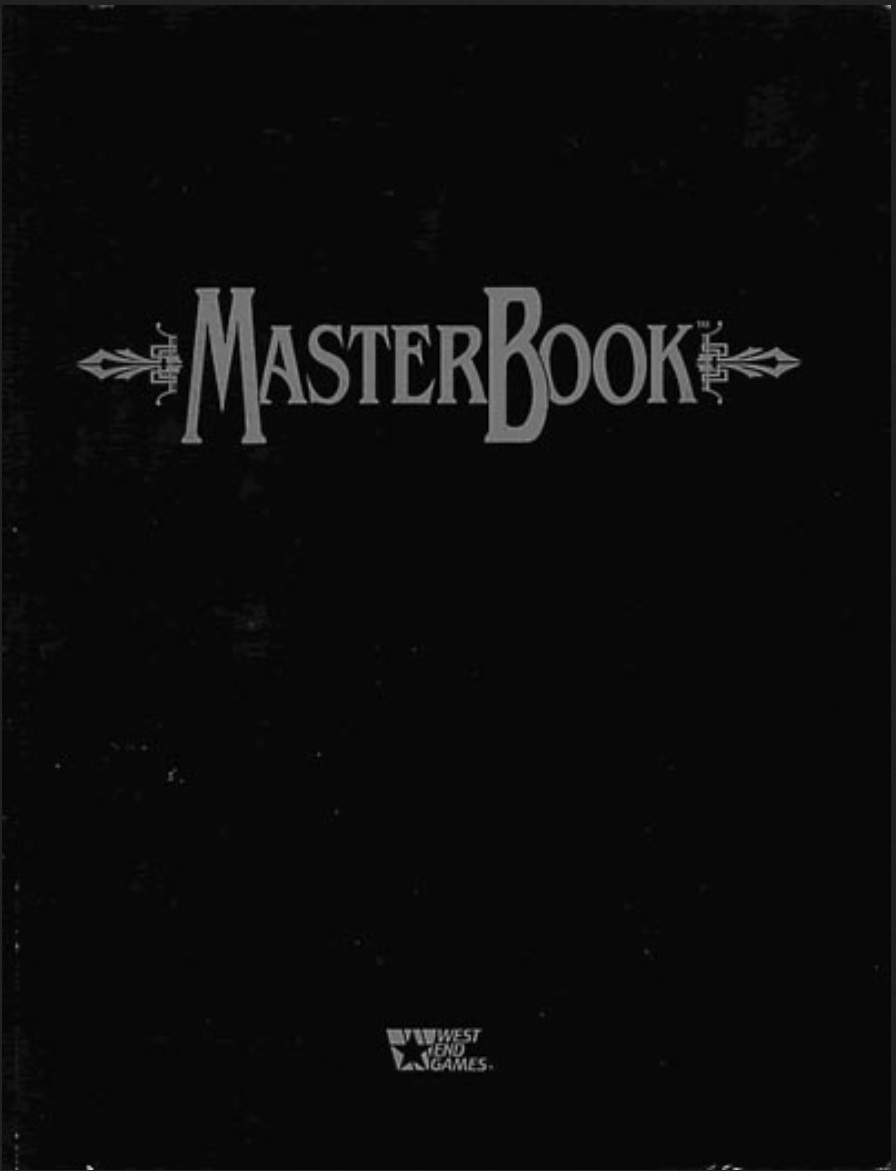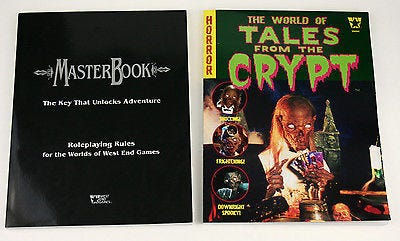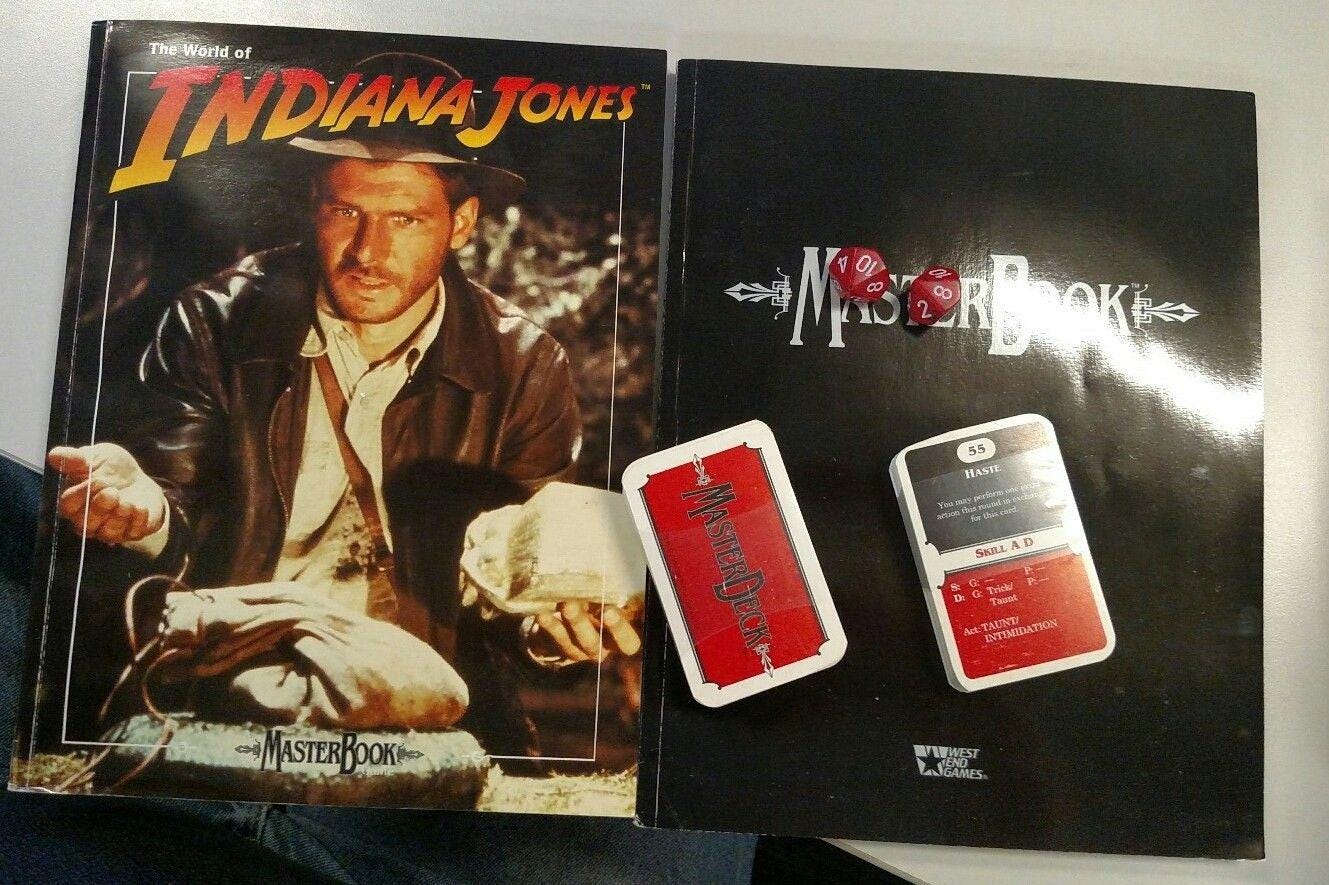
Discover more from The Evil Dungeon Master Universe
In 1994, West End Games (WEG) introduced the MasterBook system, a universal role-playing game (RPG) rule set designed to be adaptable to multiple game worlds. Unlike traditional RPGs that focus on a single setting or storyline, MasterBook was intended as a versatile system that could be applied to various licensed properties. This system was utilized in several games, including well-known franchises like Indiana Jones, Tank Girl, and Tales from the Crypt.
Core Mechanics of the MasterBook System
At the heart of the MasterBook system are its core mechanics, which revolve around skill rolls, combat, and the use of life points. Skill rolls in MasterBook require players to combine a character's skill or attribute value with the results of rolling two ten-sided dice (2d10). The total is then compared against a difficulty number (DN) to determine whether the character succeeds in their action. The system features a range of difficulty levels, from simple tasks requiring no roll to nearly impossible tasks with a DN of 25.
Combat in MasterBook is resolved through opposed rolls, where both the attacker and defender roll dice and compare their results. The attacker’s skill is matched against the defender’s relevant attribute, and the difference between their rolls determines the outcome. This opposed roll system introduces a dynamic element to combat, making it more interactive than simple attack rolls.
The Role of the Master Deck
One of the unique features of the MasterBook system is the Master Deck, a set of cards that can influence the game by providing bonuses to skill rolls or altering the storyline. The Master Deck adds an additional layer of strategy and unpredictability, allowing players to introduce new plot elements or gain advantages in certain situations. However, the system’s reliance on these cards is optional, and the core mechanics function independently of the deck.
Damage, Wounds, and Healing
Damage in the MasterBook system is determined by the weapon used and the outcome of the attack roll. Each weapon has a static damage value, which is modified by the success of the attack. Wounds are categorized into different levels—light, moderate, heavy, incapacitated, and mortal—each affecting the character's abilities and requiring varying amounts of time to heal. Life points play a crucial role in the system, as they can be spent to absorb damage, enhance rolls, or counteract an opponent’s life point expenditure.
The healing process in MasterBook is detailed and varies depending on the severity of the wounds. Characters can spend life points to reduce the impact of wounds, but more serious injuries require longer recovery times and can impose significant penalties on a character’s abilities during gameplay. This complex damage system adds depth to the game but can also slow down play as players manage their character's health and recovery.
Somethings to Think about..
One of the strengths of the MasterBook system is its flexibility, particularly in how skills are handled. Players can choose to specialize in specific areas, and the system allows for a wide range of character customization. However, this flexibility comes with challenges. The system’s reliance on dice rolls means that even a highly skilled character can fail if the dice are uncooperative. This introduces a level of unpredictability that can be both exciting and frustrating, depending on the outcome.
The MasterBook system’s reliance on dice rolls can sometimes overshadow the importance of a character's skills, making the outcome of actions heavily dependent on luck. While this adds an element of tension and surprise to the game, it can also lead to situations where a character’s abilities feel secondary to the roll of the dice.
The MasterBook system by West End Games offers a unique and flexible approach to tabletop RPGs, with its universal ruleset designed to be applied across various game worlds. Its core mechanics, including skill rolls, combat, and life point management, provide a solid foundation for gameplay, while the Master Deck adds an optional layer of strategy. However, the system’s reliance on dice rolls and the complexity of its damage and healing mechanics can present challenges for players. Despite these challenges, the MasterBook system remains a noteworthy example of 1990s RPG design, offering a versatile and engaging experience for those willing to explore its depths.
Enjoy the content on this blog? Why not become a paid subscriber to encourage more articles or buy the Evil Dungeon Master some dice!











